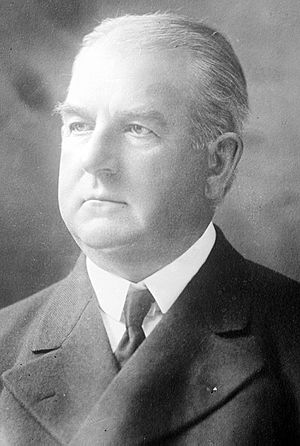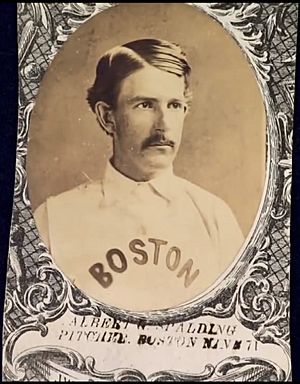Albert Spalding facts for kids
Quick facts for kids Albert Goodwill Spalding |
|||
|---|---|---|---|

Spalding the businessman at 60, 1910
|
|||
| Pitcher | |||
| Born: September 2, 1849 Byron, Illinois, U.S. |
|||
| Died: September 9, 1915 (aged 66) San Diego, California, U.S. |
|||
|
|||
| debut | |||
| May 5, 1871, for the Boston Red Stockings | |||
| Last appearance | |||
| August 31, 1878, for the Chicago White Stockings | |||
| MLB statistics | |||
| Win–loss record | 252–65 | ||
| Earned run average | 2.14 | ||
| Strikeouts | 248 | ||
| Batting average | .313 | ||
| Hits | 613 | ||
| Runs batted in | 338 | ||
| Teams | |||
|
|||
| Career highlights and awards | |||
|
|||
| Induction | 1939 | ||
| Election Method | Veterans Committee | ||
Albert Goodwill Spalding (born September 2, 1849 – died September 9, 1915) was a very important person in early professional baseball. He was a great pitcher, a manager, and a leader. He also helped start the famous A.G. Spalding company, which makes sports equipment.
Albert was born in Byron, Illinois, and grew up in Rockford, Illinois. He played professional baseball from 1871 to 1878. He was one of the first players to wear a baseball glove, which was a new idea at the time.
After he stopped playing, Spalding stayed involved with the Chicago White Stockings as their president and part-owner. In the 1880s, he took baseball players on the first-ever world tour. He also helped create the National League, which is still a major part of baseball today. He was added to the Baseball Hall of Fame in 1939.
Contents
Albert Spalding's Amazing Baseball Journey
Becoming a Baseball Star
Albert Spalding loved baseball from a young age. He started playing with a youth team called the Rockford Pioneers in 1865. When he was just 15, he joined the Rockford Forest Citys. He played for them for five years.
In 1871, professional baseball began with the National Association of Professional Base Ball Players. Spalding joined the Boston Red Stockings. He was incredibly successful as a pitcher, winning 206 games and only losing 53. He was also a good hitter, with a batting average of .323.
Creating the National League
William Hulbert, who owned the Chicago White Stockings, wanted a more organized baseball league. He asked Spalding for help to create the National League. Spalding agreed to play for the White Stockings (now the Chicago Cubs) in 1876. He also convinced other top players to join Chicago. This was kept secret at first because players could sign with any team back then.
Spalding was known as the best pitcher of the 1870s. He led the league in wins for six years in a row. In 1876, he won 47 games for the White Stockings. This helped them win the very first National League pennant.
In 1877, Spalding started using a glove to protect his hand. Other players saw him using it and soon started wearing gloves too. This made gloves a common part of baseball.
Spalding stopped playing baseball in 1878 when he was 27. But he continued to be the president and part-owner of the White Stockings. He also had a big impact on the National League. His career winning percentage of .796 is the highest ever for a baseball pitcher.
Baseball's Organizer and Leader
After signing with Chicago, Spalding and Hulbert worked together to create the National League. They brought together top teams from the East and West. This new league became the most important professional baseball organization. Spalding helped change baseball from a game played by gentlemen into a professional sport and a business.
In the 1850s, Spalding believed that baseball should not include black or women players. He also worried that professional baseball might bring in people with bad behavior.
In 1886, when Spalding was president, the Chicago White Stockings started spring training in Hot Springs, Arkansas. This is often called the "birthplace" of spring training. Spalding and his player-manager Cap Anson thought the city's natural springs would be good for the players. Many other teams soon followed this idea.
In 1905, a writer named Henry Chadwick said baseball came from British sports like cricket and rounders. Spalding wanted to prove that baseball was purely American. He set up a commission to find out where baseball really came from. The commission asked people to send in letters if they knew anything about baseball's beginnings.
After three years, the commission wrongly said that Abner Doubleday invented baseball in Cooperstown, New York, in 1839. Spalding had wanted an American origin for the game. He wrote a book called America's National Game in 1911. It was one of the first detailed histories of baseball.
In 1912, Spalding wrote that baseball was too tough for women to play on the field. He thought women should cheer from the stands instead.
Spalding: The Businessman
Starting a Sporting Goods Company
In 1876, while Spalding was still playing baseball, he and his brother Walter opened a sporting goods store in Chicago. The company grew very quickly. By 1901, they had 14 stores. They started making and selling all kinds of sports equipment. The Spalding company became famous for sporting goods and is still in business today.
Spalding Athletic Library
From 1892 to 1941, the Spalding company also sold books. These books, called the Spalding Athletic Library, covered many different sports.
The First World Baseball Tour
In 1888–1889, Spalding took a group of major league players on a trip around the world. The goal was to promote baseball and Spalding sporting goods. This was the first world baseball tour. The players traveled across the western U.S., then visited Hawaii, New Zealand, Australia, Ceylon, Egypt, Italy, France, and England. When they returned, they were greeted with big celebrations. Famous players like Cap Anson and John Montgomery Ward were part of this tour.
Spalding hoped the tour would make baseball popular worldwide. He said it helped establish "our national game throughout the world." Writer Mark Twain also praised the tour for spreading American fame.
However, the tour didn't have a huge impact on baseball's popularity overseas. Sports like soccer, rugby, and cricket were already very popular in many countries. Baseball did spread globally, but it was more of a gradual process than just from Spalding's tour.
While the players were on tour, the National League changed rules about player pay. This led to a player revolt, and a new league called the Players' League was formed in 1890. This league only lasted one year, partly because Spalding worked to limit its success.
1900 Olympics
In 1900, President McKinley chose Spalding to be the USA's Commissioner for the Summer Olympic Games.
Other Interests and Contributions
Albert Spalding was also involved in other activities. He moved to San Diego in 1900 with his second wife, Elizabeth. He became an important member of the Theosophical community Lomaland in Point Loma. He built a large home there. The Spaldings enjoyed raising racehorses and collecting Chinese art.
Spalding had a large library filled with books on many topics. From 1907 to 1909, he helped build a paved road called the "Point Loma boulevard." This road connected downtown San Diego to Point Loma and Ocean Beach. He helped plan the project and even paid for some of it himself. He also worked with others to buy the site of the original Presidio of San Diego. They turned it into a historic park and later gave it to the city.
He ran for the United States Senate in 1910 but did not win. He also helped organize the 1915 Panama–California Exposition, a big fair in San Diego.
Death
Albert Spalding passed away from a stroke on September 9, 1915, in San Diego. He was 66 years old. His ashes were scattered as he wished.
Legacy
Albert Spalding was chosen for the Baseball Hall of Fame in 1939. He was one of the first people from the 1800s to be inducted. His plaque in the Hall of Fame honors him as an "Organizational genius of baseball's pioneer days." It also mentions his time as a star pitcher and his role in organizing baseball's first world tour.
His nephew, also named Albert Spalding, became a famous violin player.
See also
- List of Major League Baseball career wins leaders
- List of Major League Baseball annual wins leaders
- List of Major League Baseball annual ERA leaders
- List of Major League Baseball player-managers
- Major League Baseball titles leaders
 | Janet Taylor Pickett |
 | Synthia Saint James |
 | Howardena Pindell |
 | Faith Ringgold |


